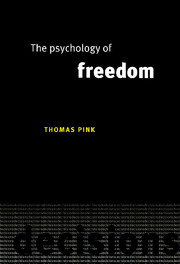Book contents
- Frontmatter
- Contents
- Acknowledgments
- Introduction
- 1 Agency and the will
- 2 Scepticism about second-order agency
- 3 Decision-making and freedom
- 4 The Psychologising conception of freedom
- 5 Decision rationality and action rationality
- 6 Decision-making and Teleology
- 7 The Regress argument
- 8 In defence of the Action model
- 9 The special-purpose agency of the will
- Conclusion
- Bibliography
- Index
8 - In defence of the Action model
Published online by Cambridge University Press: 31 August 2009
- Frontmatter
- Contents
- Acknowledgments
- Introduction
- 1 Agency and the will
- 2 Scepticism about second-order agency
- 3 Decision-making and freedom
- 4 The Psychologising conception of freedom
- 5 Decision rationality and action rationality
- 6 Decision-making and Teleology
- 7 The Regress argument
- 8 In defence of the Action model
- 9 The special-purpose agency of the will
- Conclusion
- Bibliography
- Index
Summary
DECISIONS AS REASON-APPLYING ACTIONS
Can decision-making really be what, as users of common-sense psychology, we ordinarily conceive it to be – a reason-applying, second-order action? As chapter 5 showed, there is a tension between the idea that the will serves an executive function in relation to first-order action, and the idea that the will is itself a locus of agency. If decisions serve to apply reason as it concerns subsequent action, can decisions to act be actions themselves?
If we adopt the Action model of decision rationality, we can plausibly establish that decision-making is a form of agency. The Action model says, after all, that decisions are means–end justifiable, just like the actions which they explain. Decisions to act are justified in terms of desirable ends which taking them would further – just as actions are justified in terms of desirable ends which performing them would further. And that means that agents can rationally take decisions as means to attaining desirable ends, in the same way that they can rationally perform actions as means to desirable ends. The Action model includes decisions within the same important class as the actions which decisions explain – the class of events governed by what looks very much like reason in its distinctively practical form.
But then, as we have seen, we face the problem of making sense of decision-making as a reason-applying activity. Rationally taken decisions to act must leave us disposed to act rationally thereafter.
- Type
- Chapter
- Information
- The Psychology of Freedom , pp. 228 - 246Publisher: Cambridge University PressPrint publication year: 1996
- 1
- Cited by



